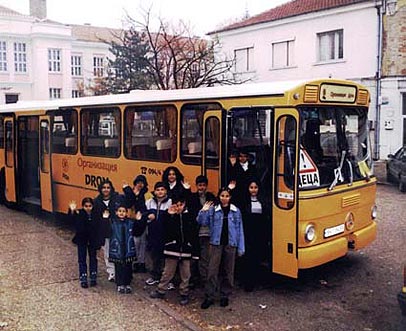Casestudy 15Bulgaria
Leadership and vision for the scaling-up
of Romani school desegregation
- description
- further information
Roma people and communities in Central and Eastern Europe face widespread discrimination, segregation and hostility. In Bulgaria, like many other countries in the region, these sentiments have persistently been reflected, among other ways, in public education. The overwhelming majority of Romani children attend segregated schools. In order to address this long-standing problem, Drom, a Roma-led organisation, teamed with the Open Society Institute Budapest’s Roma Participation Programme (RPP) to develop a high-impact civic desegregation campaign led by Romani NGOs.
The work began in 2000. Strong local and international leadership was a feature. The project undertook to develop a model of good practice at the local level in Vidin in order to show that integration could work. Building up to this stage there were intensive preparatory steps taken to develop a vision for desegregation. These included round table discussions involving education directors, school teaching staff, Roma and non-Roma community representatives, public debates and extensive media coverage to render the process completely transparent. This was necessary to cultivate the necessary consensus for successful integration and to ensure that the receiving schools would provide a welcoming environment. The partnerships formed in these stages between Romani parents, the staff and directors of the mainstream schools consolidated and legitimated the process.
In subsequent stages, the project’s leadership began to advocate for the replication of the Vidin model and to build national and international coalitions of support to advocate for substantive governmental reform to address the issue of segregation. Desegregation campaigns were Romani-led and committed to empowering Romani parents to make informed choices about their children’s futures. The campaigns very publicly and practically countered the pervasive prejudice that Roma do not value education.
Continuing after the first pilot project in Vidin, RPP-funded projects were extended to more than 2,500 children in eight cities across Bulgaria, with participants showing marked improvements over children remaining in segregated education. In 2001, Petar Stoyanov, then the President of the Republic of Bulgaria, fully endorsed the Vidin initiative and expressed the hope that very soon ‘the experience of Vidin will be common practice in the rest of Bulgaria’.
Even more striking than the rapid scaling-up and success of the Vidin model was the community effort to provide social support. Social workers visited every Romani family that had school-age children. Tutors were available for children who needed help. Teachers received special training. Families that needed food or clothing received assistance. Roma and non-Roma children shared outings, social events and cultural experiences.

© Organisation 'Drom" - Vidin
Leadership and vision were crucial in the Vidin initiative. Rumyan Russinov and Donka Panajotova were key to this. Long before desegregation was on anybody’s agenda concerning Roma, Russinov, the director of the RPP between 2000 and 2005, began campaigning. His leadership was instrumental in bringing together the non-governmental coalition of Roma and pro-Roma organizations that succeeded in bringing the Bulgarian government to the table and adopting the Framework Program for Equal Opportunities in April 1999.
Commitments from the Bulgarian government provided opportunities fo r civil society initiatives and Romani-led advocacy. Russinov’s persistent efforts succeeded in firmly establishing school desegregation on the public agenda, and led the way in internationalising the issue. Importantly, at national level, he had the legitimacy and credibility to hold together a coalition of Romani NGOs, educational experts and human rights activists. Russinov also had the negotiating skills to engage other stakeholders and bring local and national governments into dialogue.
At the local level, Panajotova, the leader of Drom and a former teacher, used her proven record in education, her charisma and her management and motivational skills to form a team sharing her passion for developing this project. Her context-specific expertise and contacts within the educational system, combined with her NGO experience as well as her intelligence, imagination and generosity of spirit were central to mobilizing willing partners and popularizing the idea of school desegregation among sceptical Romani and non-Romani community members.Go back to case studies listing
Director
Roma Participation Programme
Open Society Institute
H-1051 Budapest
Hungary
Tel: +361 327 3858
e-mail: brorke@osi.hu
Deputy Director
Roma Education Fund
H-1056 Budapest
Váci.u 63
Hungary
Tel: +361 235-8030
e-mail: info@romaeducationfund.org
Director
NGO ‘Organization Drom’
Vidin 3700
k/s ‘Saedinenie’, bl.4, parter
Bulgaria
Tel: +359 94 606 209
e-mail: organization_drom@lycos.com
